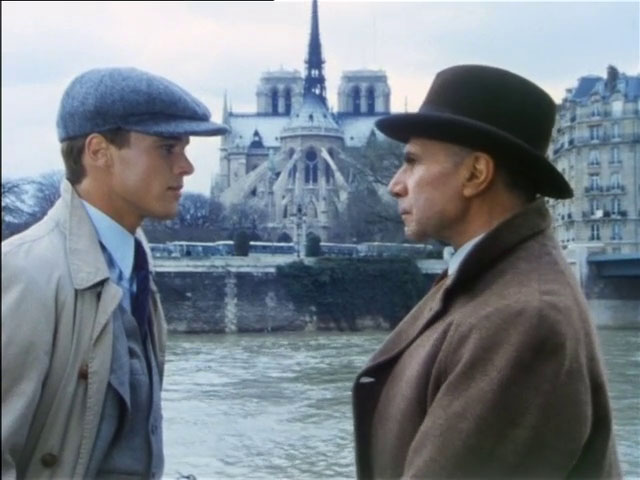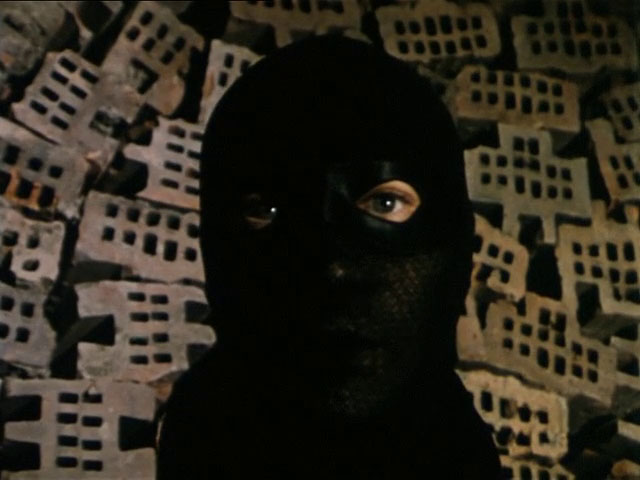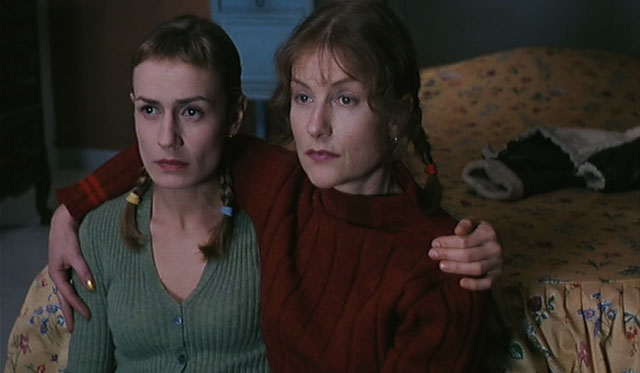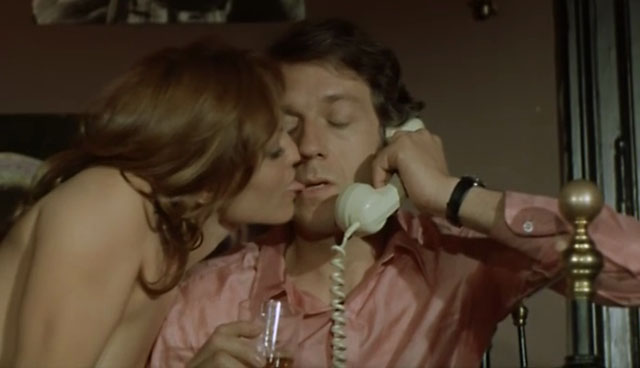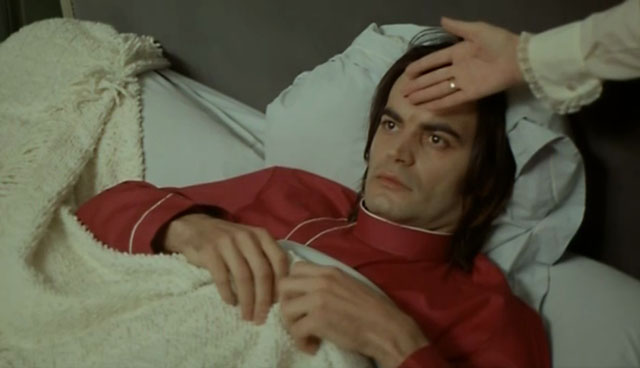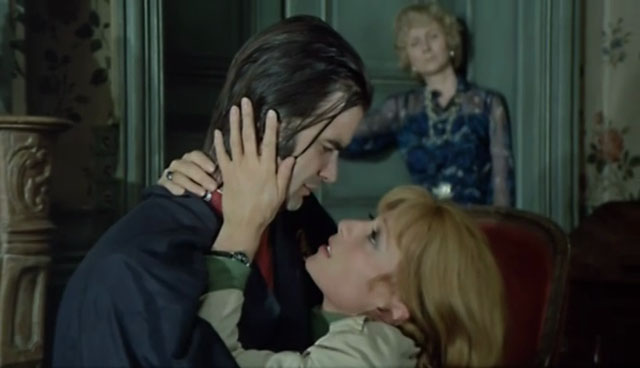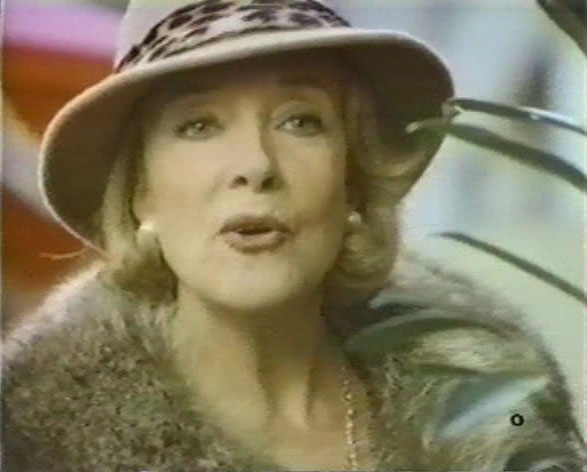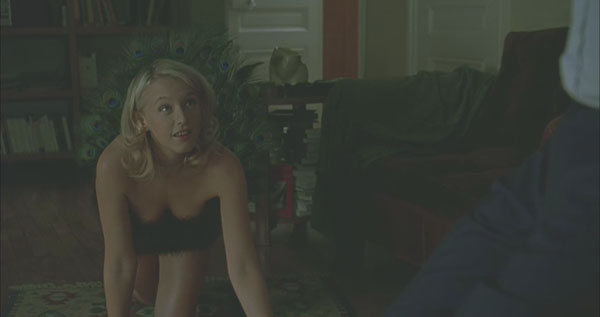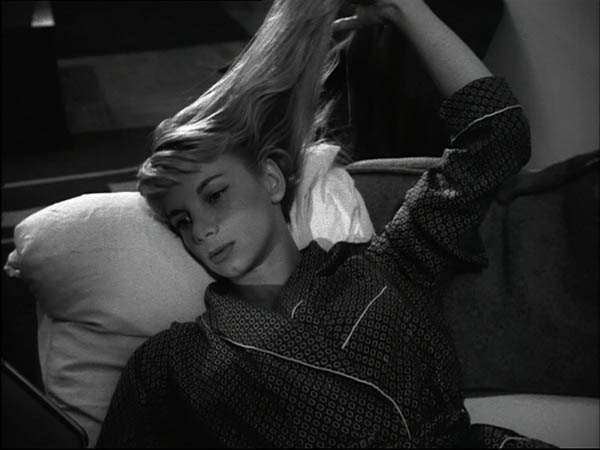“All style, no substance.”
“That’s what dreams are made of.”
Dr. M, der Spieler:
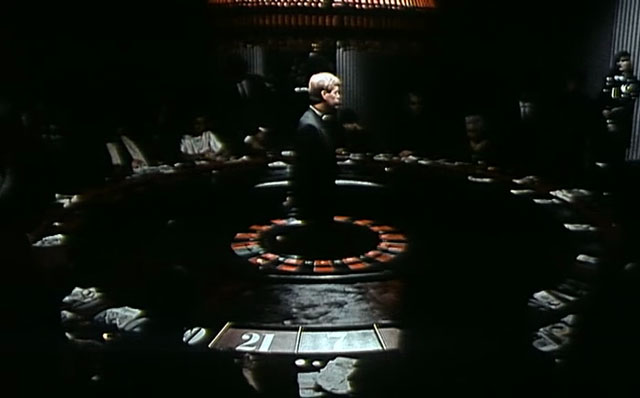
In between two highly-regarded Isabelle Huppert-starring late works by Chabrol, I watched this ambitious, now-obscure Fritz Lang homage. Almost the only mentions of it online appear in sentences such as: “Chabrol’s career wasn’t perfect; he also made disastrous flops for foreign distributors, such as the forgotten turd Dr. M.” So I was excited about the Mabuse connections (they were very slim) and M connections (there weren’t any), but kept very low expectations – then the movie turned out to be quite good.
It never tops the great opening: 3 minutes of cross-cutting between four tense, unexplained segments, each ending with a death, with a TV broadcast keeping time between locations. Looks like a high enough budget, judging from the scale of the fire and explosions that follow. So why did an interesting, high-tension sci-fi movie with good explosions turn into a failure? Well, the storyline and the actors aren’t actually all that amazingly good, rather made-for-TV quality. But more importantly, it’s set in a future where Germany was still divided by the Berlin Wall, which fell many months before the movie was released – so all of the script’s east/west occupation metaphors were seen as laughable by the time it shirked into theaters.

I’m not sure that Flashdance’s Jennifer Beals was the most bankable international star for a prestige picture, either. Beals was also in Sam Fuller’s Madonna and the Dragon in 1990, and Chabrol himself had appeared in Fuller’s Thieves After Dark a few years prior. Here she plays the spokeswoman for a vacation getaway company – Theratos – which advertises incessantly all over the city, cheapo-Blade-Runner-style. Movie was shot in Berlin and has that 70’s-80’s grimy film look, and also stars falsely-gruff-voiced German actor Jan Niklas as our rebel lieutenant hero. So maybe I overestimated the film’s budget.
Jennifer Beals:

Beals is introduced in a nuclear mosh-pit dance club. My favorite fanciful sci-fi detail in the movie is more social than technological – there’s a woman in her seventies drinking at the bar in the club amongst strobe lights and deafening thrash music. The city (or at least the TV news) is obsessed with a recent series of suicides, and Claus, the cop on the case, finds a connection to Beals, in that each suicide was darkly obsessed with her, taking photographs and advertisements with her face and mangling them. Meanwhile, her omnipresent ads for Theratos (pronounced somewhat like Toronto) has language like “drift off, let yourself go, leave it all behind, time to go” as the cops unveil more suicide victims – shades of They Live.

Claus and his partner Stieglitz (Benoit Regent: Binoche’s lover in Blue and the guy who stalks all the girls of Rivette’s Gang of Four for some reason I don’t recall) are the only two cops on the case of the suicides, and eventually, like more than halfway into the movie, they make the incredible discovery that the vortex-turtle medallions found on all the suicide victims are from Theratos! That’s right, the very logo of the company that seems to be the only advertiser in the nation, and they discover this halfway through the movie. Look, you can see it on the wall-mounted motion billboards:

But maybe the reason these two dull-wits are running the investigation is that their superiors are actually the evildoers behind the whole conspiracy. Mustachioed ham Doctor Marsfeldt (Alan Bates of Georgy Girl and the Mel Gibson Hamlet) is our Mabuse substitute, complete with a Dr-Claw-in-Inspector-Gadget array of video screens that can see anything in the city, and balding Captain Engler is his enforcer within the police. I can’t recall if Marsfeldt has some sort of government position or what power he holds over the police, exactly, but he turns out to be the owner of Theratos and father of Jennifer Beals – two things I would’ve thought would be public knowledge about the biggest company and most visible public figure in town.
Dr. M:

Filmed in English, in Berlin, so the rest of the not-great actors have a range of accents and delivery – including Peter Fitz (the lead guy’s sad-mouthed uncle in Werckmeister Harmonies), Hanns Zischler (Germany Year 90 Nine Zero, Kings of the Road) and William Berger (Devil Fish). Zischler plays Moser (pronounced Moo-zuh, reminded of Ma-bu-zuh) – not sure who he was exactly, but he got close to exposing mad doctor Marsfeldt before getting shot in the back by a LASER, one of the few reminders that we are in the future.
Return of the Jedi? No! It’s Dr. M – now with lasers!

I looked up Theratos online but the closest I found was Thanatos, the Greek death demon. I did find David Kalat’s “The Strange Case of Dr. Mabuse,” which has a whole chapter on the movie – counts as the most in-depth writing on the film to be found online, even if Google Books only has half the pages of that chapter. “Theratos is owned by Marsfeldt’s Mater Media. Like a nuclear explosion in which the atomic reaction generates the fuel that keeps itself blazing, Marsfeldt is sitting pretty on a recursive catastrophe. The more people commit suicide, the more desperate the citizens become to escape the city, the more they mob the Theratos offices to book vacations. The more people visit Theratos, the more people commit suicide. And as the cycle consumes more and more unwitting Berliners, Marsfeldt’s companies – Mater Media and Theratos – make gargantuan profits.”
The floating cult of theratos:

Kalat says it’s the last Mabuse movie to date, but as much as I want to believe, I wouldn’t even call it a Mabuse movie. There is, briefly, a character blatantly named Herr Lang. It’s definitely a stylish, intriguingly plotted movie, even if I have story detail problems and the dialogue is sometimes weak. The second-to-last Chabrol feature shot by cinematographer Jean Rabier, who also worked with Varda and Demy.
Engler and Claus:

Oh, anyway at the end the gruff cop hero (whose pregnant wife died 2 years ago, just to give his character some inner pain) saves the girl from crazies and they go off to Theratos, which isn’t as cool a getaway spot as promised by her own ads (as one attendee puts it after being isolated from his wife, “If you can’t screw on vacation, when CAN you screw?”). The cop and Beals do screw at some point, while Dr. M simultaneously watches disaster and atrocity footage on his fuzzy b/w TV – an unnecessarily disturbing detail. Eventually they break into the TV studio and Beals takes to the airwaves, saying some new agey babble about positivity that somehow undoes all the propaganda of the late-night talk hosts (have I mentioned them?) and her own Theratos ad campaign, as across the city people put down their suicide weapons and go on with their lives.
Chabrol:
“Dr. M stresses the fact that we are continuously manipulated… and that political speak has invaded every circle. … This is why, faced with steely-hearted strategy experts and computer brains, I hope that my film will be stimulating, since it does homage to lucidity as our only defensive weapon.”



